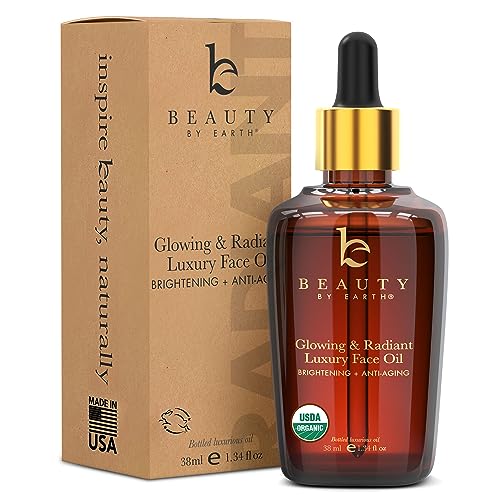
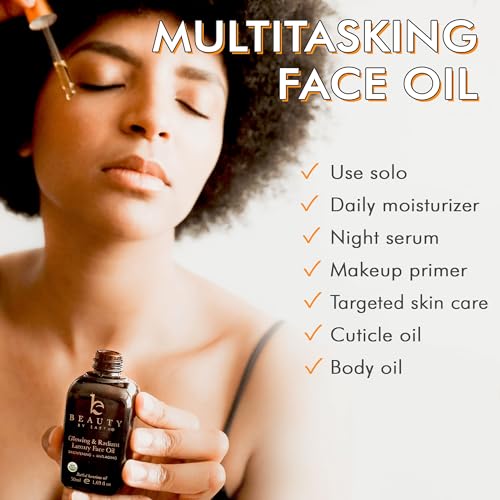

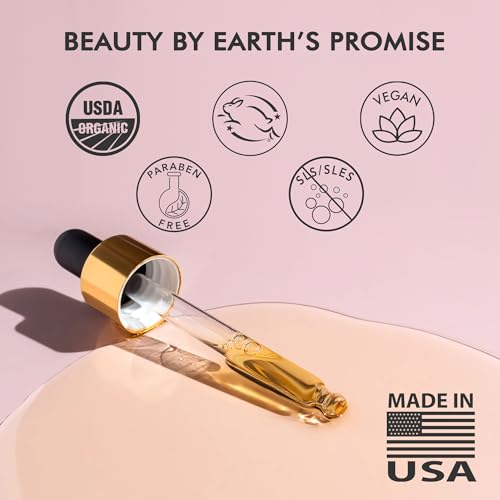
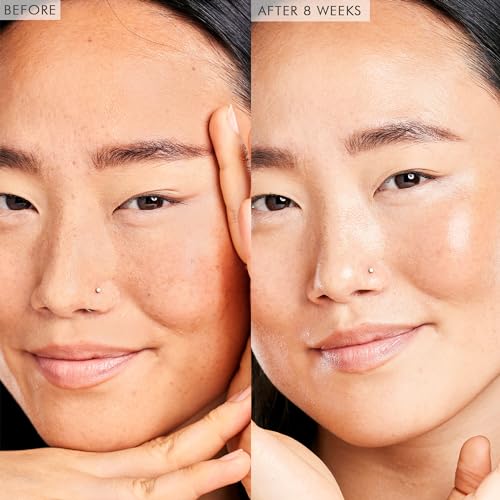
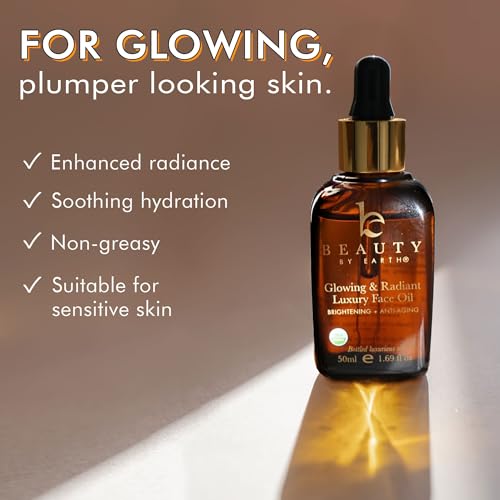
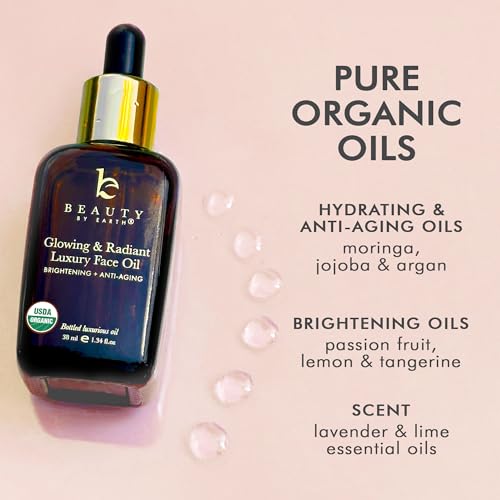
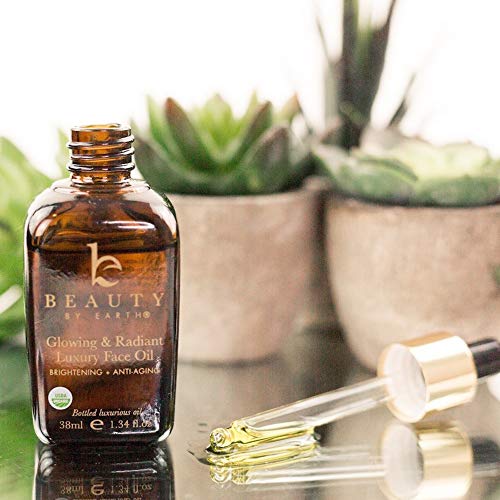
Beauty by Earth Organic Face Oil - Deep Hydration & Antioxidant Rich, Brightening - 1oz


Rosmarinus Officinalis (Rosemary) Leaf Extract
Medium RiskRosemary leaf extract is produced from the leaves of the Rosmarinus officinalis plant. It is commonly used in cosmetic formulations for its potential antioxidant properties and fragrance. The extract may also contribute to the preservation of products due to its antimicrobial characteristics.
Sustai Insights
Rosemary leaf extract offers functional benefits such as antioxidant and antimicrobial properties, which can enhance product stability and shelf-life. It is generally considered low risk for carcinogenicity and reproductive toxicity, but it carries a moderate potential for allergic reactions. Environmentally, it poses low risk with no significant pollutant or bioaccumulation concerns. Regulatory bodies have not placed significant restrictions on its use, although some verified products cannot contain certain concentrations. Overall, the ingredient's risk level is medium, necessitating careful usage practices to mitigate allergic responses.
Citrus Aurantifolia (Lime) Peel Oil
Medium RiskCitrus aurantifolia (lime) peel oil is derived from the peel of lime fruits. It is commonly used for its aromatic properties in various products, including cosmetics and personal care items, where it may serve as a fragrance or natural preservative.
Sustai Insights
Citrus aurantifolia (lime) peel oil offers functional benefits as a natural fragrance and potential antimicrobial agent. However, it has a high allergenic potential, posing risks of skin irritation and sensitization. Environmental concerns include its persistence in ecosystems and moderate use restrictions in some regions. Regulatory bodies have advised caution regarding its use due to these health and environmental risks. Overall, the ingredient is assessed as a medium risk, suggesting careful usage and consideration of alternatives, such as non-citrus essential oils or synthetic fragrances, for sensitive applications.
Citrus Reticulata Peel Oil
Medium RiskCitrus reticulata peel oil is an essential oil derived from the peel of the mandarin orange. It is commonly used in cosmetic and personal care products for its fragrance and potential skin-conditioning properties. The oil is obtained through cold pressing, preserving its natural components.
Sustai Insights
Citrus reticulata peel oil offers functional benefits such as natural fragrance and potential antimicrobial effects. However, it carries a high allergenic potential, with risks of skin irritation and other allergic reactions. Regulatory bodies have noted moderate usage restrictions due to persistence and bioaccumulation concerns. Overall, the ingredient presents a medium risk level, necessitating careful usage practices, particularly for sensitive populations. Safer alternatives may include synthetic or other plant-derived fragrances.
Citrus Aurantium Dulcis (Orange) Peel Oil
Medium RiskCitrus aurantium dulcis (orange) peel oil is derived from the peel of oranges and is commonly used in cosmetic and personal care products for its fragrance and potential skin benefits. It is known for its aromatic properties and is often included in formulations aimed at enhancing scent profiles.
Sustai Insights
Citrus aurantium dulcis (orange) peel oil offers functional benefits such as providing a pleasant scent and potential antimicrobial properties. However, it poses a high allergy risk and may cause skin irritation in sensitive individuals. Environmental concerns include moderate persistence and potential to contribute to pollution. Regulatory warnings indicate restrictions on use in certain products. Overall, the risk level is assessed as medium, and users are advised to practice caution, particularly those with known allergies. Alternatives like sweet orange essential oil may provide similar benefits with potentially lower risks.
Citrus Limon (Lemon) Peel Oil
Medium RiskCitrus limon (lemon) peel oil is an essential oil derived from the peel of lemons, commonly used for its aromatic properties and as a natural flavoring agent. It is often included in personal care products for its fragrance and potential antimicrobial properties.
Sustai Insights
Citrus limon (lemon) peel oil offers functional benefits as a natural fragrance and may possess antimicrobial properties, contributing to product stability. However, it is associated with a high allergenic potential, moderate use restrictions, and has been noted for its persistence in the environment. Regulatory warnings indicate restrictions on verified products due to potential irritation and sensitization. The overall risk level is medium, and safe usage practices should be observed to mitigate exposure risks. Alternatives include safer fragrance options or essential oils with lower allergenic profiles.
Passiflora Edulis (Passion Fruit) Seed Oil
Low RiskPassiflora edulis seed oil is a fixed oil extracted from the seeds of the passion fruit plant. It is primarily used in cosmetic formulations for its emollient properties, providing hydration and skin conditioning. Its light texture makes it suitable for various skincare products.
Sustai Insights
Passiflora edulis seed oil offers functional benefits such as skin hydration and emollience, and it is sustainably sourced with low environmental impact. Health risks are minimal, with low concerns for carcinogenicity, allergies, or reproductive toxicity. Regulatory status is favorable with no significant restrictions. Overall, the ingredient presents a low-risk assessment for health and environmental impact, making it a suitable choice in cosmetic formulations.
Argania Spinosa (Argan) Kernel Oil
Low RiskArgania spinosa (argan) kernel oil is a fixed oil extracted from the kernels of the argan tree, native to Morocco. It is commonly used in cosmetic formulations for its moisturizing properties, serving as an emollient and skin conditioner.
Sustai Insights
Argania spinosa kernel oil offers functional benefits such as effective hydration and nourishment for the skin and hair. It is sustainably sourced and biodegradable, contributing positively to environmental considerations. Health risks are low, with minimal concerns regarding carcinogenicity, allergies, or reproductive toxicity. There are no current regulatory restrictions on its use. Overall, it poses low risk, making it a suitable ingredient in cosmetic products. Safe usage practices should be maintained, and alternatives like jojoba oil may also be considered for similar benefits.
Hippophae Rhamnoides (Sea Buckthorn) Oil
Low RiskHippophae rhamnoides oil, commonly known as sea buckthorn oil, is a fixed oil extracted from the berries of the sea buckthorn plant. It is primarily used in cosmetic formulations for its moisturizing and skin-nourishing properties, often incorporated for its fatty acid profile and antioxidant content.
Sustai Insights
Hippophae rhamnoides oil offers functional benefits such as skin hydration and potential antioxidant effects, contributing to improved skin health. It is sustainably sourced and biodegradable. The ingredient is associated with low health risks, including minimal concerns for carcinogenicity, allergies, and reproductive toxicity. Environmental risks are also low, with no significant pollutant or bioaccumulation potential identified. Regulatory status indicates no severe restrictions. Overall, this ingredient is assessed as low risk and safe for use in cosmetic products, with no specific safer alternatives readily available.
Lavandula Angustifolia (Lavender) Flower Oil
Low RiskLavandula angustifolia (lavender) flower oil is an essential oil derived from the flowers of the lavender plant. It is commonly used in personal care products for its aromatic properties and is known for its potential soothing effects in formulations.
Sustai Insights
Lavender oil provides functional benefits such as fragrance enhancement and potential calming effects, contributing to user experience in various personal care products. It is sustainably sourced and has low toxicity levels. Health risks associated with lavender oil are minimal, with low concerns for carcinogenicity, allergies, and reproductive toxicity. Environmental risks are also low, with no significant pollutant concerns. Regulatory assessments indicate no current restrictions, affirming its safety for use. Overall, the ingredient is considered low risk, making it a favorable choice in formulations.
Moringa Oleifera
Low RiskMoringa oleifera is a plant known for its nutritional and medicinal properties. Commonly referred to as the drumstick tree or miracle tree, it is used in various products for its high content of vitamins, minerals, and antioxidants, contributing to health and wellness.
Sustai Insights
Moringa oleifera offers functional benefits, such as being a rich source of nutrients and antioxidants, potentially supporting overall health. It is sustainably sourced and biodegradable. Health risks are minimal, with low concerns for carcinogenicity, allergies, or reproductive toxicity. Environmental risks are also low, with no significant pollutant or bioaccumulation potential reported. Regulatory bodies do not impose restrictions on its use. Overall, it presents a low risk profile, making it a favorable ingredient in formulations.
Calendula Officinalis (Pot Marigold) Flower Extract
Low RiskExtract of the Calendula (Calendula officinalis) flower, commonly known as pot marigold, is utilized in cosmetic formulations for its soothing and anti-inflammatory properties. It is often included in creams, lotions, and ointments to promote skin health and healing.
Sustai Insights
Calendula officinalis flower extract offers functional benefits such as skin soothing and anti-inflammatory effects, making it valuable in topical applications. It is considered low risk for health impacts, with minimal concerns regarding carcinogenicity, allergies, or reproductive toxicity. Environmentally, it presents low pollution potential and is not bioaccumulative. Regulatory bodies have not imposed significant restrictions. Safe usage practices should be followed, and while alternatives exist, this extract is generally regarded as a low-risk option for cosmetic use.
Punica Granatum (Pomegranate) Seed Oil
Low RiskPunica granatum (pomegranate) seed oil is derived from the seeds of the pomegranate fruit. It serves primarily as a moisturizer and emollient in cosmetic formulations, contributing to skin hydration and texture improvement. The oil is rich in fatty acids and antioxidants, enhancing its functional properties in personal care products.
Sustai Insights
Punica granatum (pomegranate) seed oil offers functional benefits as a moisturizer and potential antioxidant. It is generally considered low risk for cancer, allergies, and reproductive toxicity, while contamination concerns are noted as low to moderate. Regulatory assessments do not impose significant restrictions on its use. Environmental impacts are minimal, and it is not classified as bioaccumulative. Safe usage practices are recommended, and alternatives may include other plant-based oils. Overall, the ingredient is assessed as low risk based on current scientific consensus.
Tocopherol
Low RiskTocopherols are a class of naturally occurring compounds, primarily known for their role as antioxidants. They are commonly used in cosmetic and skincare products to help stabilize formulations and protect ingredients from oxidative damage.
Sustai Insights
Tocopherols provide functional benefits such as antioxidant protection and skin conditioning. They are generally recognized as safe, with low concerns regarding carcinogenicity, allergies, and reproductive toxicity. However, enhanced skin absorption and potential endocrine disruption are noted. Regulatory bodies have not imposed significant restrictions on tocopherols, categorizing the overall risk as low. Safe usage practices should be observed, and while alternatives exist, tocopherols remain a viable option in formulations.
Simmondsia Chinensis (Jojoba) Seed Oil
Low RiskSimmondsia chinensis (jojoba) seed oil is extracted from the seeds of the jojoba plant. It is commonly used in cosmetics for its moisturizing properties and ability to mimic human sebum, making it beneficial for skin and hair care formulations.
Sustai Insights
Jojoba seed oil offers functional benefits such as effective moisturization and emollience, contributing to skin hydration and smoothness. It is sustainably sourced and biodegradable. Health risks are low, with minimal concerns regarding carcinogenicity, allergies, and reproductive toxicity. Environmental risks are also low, as it does not significantly contribute to pollution or bioaccumulation. Currently, there are no regulatory restrictions on its use. Overall, the risk level is low, and it is considered a safe ingredient with no significant adverse effects.
Rosmarinus Officinalis (Rosemary) Leaf Extract
Medium RiskRosemary leaf extract is produced from the leaves of the Rosmarinus officinalis plant. It is commonly used in cosmetic formulations for its potential antioxidant properties and fragrance. The extract may also contribute to the preservation of products due to its antimicrobial characteristics.
Sustai Insights
Rosemary leaf extract offers functional benefits such as antioxidant and antimicrobial properties, which can enhance product stability and shelf-life. It is generally considered low risk for carcinogenicity and reproductive toxicity, but it carries a moderate potential for allergic reactions. Environmentally, it poses low risk with no significant pollutant or bioaccumulation concerns. Regulatory bodies have not placed significant restrictions on its use, although some verified products cannot contain certain concentrations. Overall, the ingredient's risk level is medium, necessitating careful usage practices to mitigate allergic responses.
Passiflora Edulis (Passion Fruit) Seed Oil
Low RiskPassiflora edulis seed oil is a fixed oil extracted from the seeds of the passion fruit plant. It is primarily used in cosmetic formulations for its emollient properties, providing hydration and skin conditioning. Its light texture makes it suitable for various skincare products.
Sustai Insights
Passiflora edulis seed oil offers functional benefits such as skin hydration and emollience, and it is sustainably sourced with low environmental impact. Health risks are minimal, with low concerns for carcinogenicity, allergies, or reproductive toxicity. Regulatory status is favorable with no significant restrictions. Overall, the ingredient presents a low-risk assessment for health and environmental impact, making it a suitable choice in cosmetic formulations.
Citrus Aurantifolia (Lime) Peel Oil
Medium RiskCitrus aurantifolia (lime) peel oil is derived from the peel of lime fruits. It is commonly used for its aromatic properties in various products, including cosmetics and personal care items, where it may serve as a fragrance or natural preservative.
Sustai Insights
Citrus aurantifolia (lime) peel oil offers functional benefits as a natural fragrance and potential antimicrobial agent. However, it has a high allergenic potential, posing risks of skin irritation and sensitization. Environmental concerns include its persistence in ecosystems and moderate use restrictions in some regions. Regulatory bodies have advised caution regarding its use due to these health and environmental risks. Overall, the ingredient is assessed as a medium risk, suggesting careful usage and consideration of alternatives, such as non-citrus essential oils or synthetic fragrances, for sensitive applications.
Argania Spinosa (Argan) Kernel Oil
Low RiskArgania spinosa (argan) kernel oil is a fixed oil extracted from the kernels of the argan tree, native to Morocco. It is commonly used in cosmetic formulations for its moisturizing properties, serving as an emollient and skin conditioner.
Sustai Insights
Argania spinosa kernel oil offers functional benefits such as effective hydration and nourishment for the skin and hair. It is sustainably sourced and biodegradable, contributing positively to environmental considerations. Health risks are low, with minimal concerns regarding carcinogenicity, allergies, or reproductive toxicity. There are no current regulatory restrictions on its use. Overall, it poses low risk, making it a suitable ingredient in cosmetic products. Safe usage practices should be maintained, and alternatives like jojoba oil may also be considered for similar benefits.
Hippophae Rhamnoides (Sea Buckthorn) Oil
Low RiskHippophae rhamnoides oil, commonly known as sea buckthorn oil, is a fixed oil extracted from the berries of the sea buckthorn plant. It is primarily used in cosmetic formulations for its moisturizing and skin-nourishing properties, often incorporated for its fatty acid profile and antioxidant content.
Sustai Insights
Hippophae rhamnoides oil offers functional benefits such as skin hydration and potential antioxidant effects, contributing to improved skin health. It is sustainably sourced and biodegradable. The ingredient is associated with low health risks, including minimal concerns for carcinogenicity, allergies, and reproductive toxicity. Environmental risks are also low, with no significant pollutant or bioaccumulation potential identified. Regulatory status indicates no severe restrictions. Overall, this ingredient is assessed as low risk and safe for use in cosmetic products, with no specific safer alternatives readily available.
Lavandula Angustifolia (Lavender) Flower Oil
Low RiskLavandula angustifolia (lavender) flower oil is an essential oil derived from the flowers of the lavender plant. It is commonly used in personal care products for its aromatic properties and is known for its potential soothing effects in formulations.
Sustai Insights
Lavender oil provides functional benefits such as fragrance enhancement and potential calming effects, contributing to user experience in various personal care products. It is sustainably sourced and has low toxicity levels. Health risks associated with lavender oil are minimal, with low concerns for carcinogenicity, allergies, and reproductive toxicity. Environmental risks are also low, with no significant pollutant concerns. Regulatory assessments indicate no current restrictions, affirming its safety for use. Overall, the ingredient is considered low risk, making it a favorable choice in formulations.
Citrus Reticulata Peel Oil
Medium RiskCitrus reticulata peel oil is an essential oil derived from the peel of the mandarin orange. It is commonly used in cosmetic and personal care products for its fragrance and potential skin-conditioning properties. The oil is obtained through cold pressing, preserving its natural components.
Sustai Insights
Citrus reticulata peel oil offers functional benefits such as natural fragrance and potential antimicrobial effects. However, it carries a high allergenic potential, with risks of skin irritation and other allergic reactions. Regulatory bodies have noted moderate usage restrictions due to persistence and bioaccumulation concerns. Overall, the ingredient presents a medium risk level, necessitating careful usage practices, particularly for sensitive populations. Safer alternatives may include synthetic or other plant-derived fragrances.
Moringa Oleifera
Low RiskMoringa oleifera is a plant known for its nutritional and medicinal properties. Commonly referred to as the drumstick tree or miracle tree, it is used in various products for its high content of vitamins, minerals, and antioxidants, contributing to health and wellness.
Sustai Insights
Moringa oleifera offers functional benefits, such as being a rich source of nutrients and antioxidants, potentially supporting overall health. It is sustainably sourced and biodegradable. Health risks are minimal, with low concerns for carcinogenicity, allergies, or reproductive toxicity. Environmental risks are also low, with no significant pollutant or bioaccumulation potential reported. Regulatory bodies do not impose restrictions on its use. Overall, it presents a low risk profile, making it a favorable ingredient in formulations.
Calendula Officinalis (Pot Marigold) Flower Extract
Low RiskExtract of the Calendula (Calendula officinalis) flower, commonly known as pot marigold, is utilized in cosmetic formulations for its soothing and anti-inflammatory properties. It is often included in creams, lotions, and ointments to promote skin health and healing.
Sustai Insights
Calendula officinalis flower extract offers functional benefits such as skin soothing and anti-inflammatory effects, making it valuable in topical applications. It is considered low risk for health impacts, with minimal concerns regarding carcinogenicity, allergies, or reproductive toxicity. Environmentally, it presents low pollution potential and is not bioaccumulative. Regulatory bodies have not imposed significant restrictions. Safe usage practices should be followed, and while alternatives exist, this extract is generally regarded as a low-risk option for cosmetic use.
Citrus Aurantium Dulcis (Orange) Peel Oil
Medium RiskCitrus aurantium dulcis (orange) peel oil is derived from the peel of oranges and is commonly used in cosmetic and personal care products for its fragrance and potential skin benefits. It is known for its aromatic properties and is often included in formulations aimed at enhancing scent profiles.
Sustai Insights
Citrus aurantium dulcis (orange) peel oil offers functional benefits such as providing a pleasant scent and potential antimicrobial properties. However, it poses a high allergy risk and may cause skin irritation in sensitive individuals. Environmental concerns include moderate persistence and potential to contribute to pollution. Regulatory warnings indicate restrictions on use in certain products. Overall, the risk level is assessed as medium, and users are advised to practice caution, particularly those with known allergies. Alternatives like sweet orange essential oil may provide similar benefits with potentially lower risks.
Punica Granatum (Pomegranate) Seed Oil
Low RiskPunica granatum (pomegranate) seed oil is derived from the seeds of the pomegranate fruit. It serves primarily as a moisturizer and emollient in cosmetic formulations, contributing to skin hydration and texture improvement. The oil is rich in fatty acids and antioxidants, enhancing its functional properties in personal care products.
Sustai Insights
Punica granatum (pomegranate) seed oil offers functional benefits as a moisturizer and potential antioxidant. It is generally considered low risk for cancer, allergies, and reproductive toxicity, while contamination concerns are noted as low to moderate. Regulatory assessments do not impose significant restrictions on its use. Environmental impacts are minimal, and it is not classified as bioaccumulative. Safe usage practices are recommended, and alternatives may include other plant-based oils. Overall, the ingredient is assessed as low risk based on current scientific consensus.
Citrus Limon (Lemon) Peel Oil
Medium RiskCitrus limon (lemon) peel oil is an essential oil derived from the peel of lemons, commonly used for its aromatic properties and as a natural flavoring agent. It is often included in personal care products for its fragrance and potential antimicrobial properties.
Sustai Insights
Citrus limon (lemon) peel oil offers functional benefits as a natural fragrance and may possess antimicrobial properties, contributing to product stability. However, it is associated with a high allergenic potential, moderate use restrictions, and has been noted for its persistence in the environment. Regulatory warnings indicate restrictions on verified products due to potential irritation and sensitization. The overall risk level is medium, and safe usage practices should be observed to mitigate exposure risks. Alternatives include safer fragrance options or essential oils with lower allergenic profiles.
Tocopherol
Low RiskTocopherols are a class of naturally occurring compounds, primarily known for their role as antioxidants. They are commonly used in cosmetic and skincare products to help stabilize formulations and protect ingredients from oxidative damage.
Sustai Insights
Tocopherols provide functional benefits such as antioxidant protection and skin conditioning. They are generally recognized as safe, with low concerns regarding carcinogenicity, allergies, and reproductive toxicity. However, enhanced skin absorption and potential endocrine disruption are noted. Regulatory bodies have not imposed significant restrictions on tocopherols, categorizing the overall risk as low. Safe usage practices should be observed, and while alternatives exist, tocopherols remain a viable option in formulations.
Simmondsia Chinensis (Jojoba) Seed Oil
Low RiskSimmondsia chinensis (jojoba) seed oil is extracted from the seeds of the jojoba plant. It is commonly used in cosmetics for its moisturizing properties and ability to mimic human sebum, making it beneficial for skin and hair care formulations.
Sustai Insights
Jojoba seed oil offers functional benefits such as effective moisturization and emollience, contributing to skin hydration and smoothness. It is sustainably sourced and biodegradable. Health risks are low, with minimal concerns regarding carcinogenicity, allergies, and reproductive toxicity. Environmental risks are also low, as it does not significantly contribute to pollution or bioaccumulation. Currently, there are no regulatory restrictions on its use. Overall, the risk level is low, and it is considered a safe ingredient with no significant adverse effects.
Experience radiant and glowing skin with Beauty by Earth Organic Face Oil. Specially formulated for dry, normal, and sensitive skin, this luxurious blend of organic moringa, jojoba, and argan oils delivers deep hydration and age-defying benefits. Packed with antioxidants, this face oil nourishes your skin while providing a natural defense against environmental stressors. Enjoy a product free from harmful chemicals, crafted with only the finest organic ingredients for your peace of mind.
- Deep Hydration: This face oil provides intense moisture, ensuring skin feels plump and revitalized.
- Age-Defying Ingredients: Enriched with organic argan, jojoba, and moringa oils, promoting youthful skin and enhancing elasticity.
- Antioxidant Protection: Fights free radicals to restore your skin's natural glow and combat dullness.
- Pure and Safe: Made without toxic chemicals, ensuring a natural skincare experience you can trust.
- Easy Application: Incorporate effortlessly into your daily routine for maximum hydration and luminosity.
Subscribe & Save with Sustai
- Best Price Guarantee: Always enjoy the lowest prices on sustainable home essentials.
- No Surprises: We’ll notify you before shipping. No hidden fees, ever.
- You’re in Charge: Change, pause, or cancel your subscription anytime with ease.
- Eco-Friendly Deliveries: Our grouped shipments mean less packaging and lower emissions.
Join us on a sustainable journey. Special offers for a limited time! Prices and promotions may change.
Recommended Products
Experience radiant and glowing skin with Beauty by Earth Organic Face Oil. Specially formulated for dry, normal, and sensitive skin, this luxurious blend of organic moringa, jojoba, and argan oils delivers deep hydration and age-defying benefits. Packed with antioxidants, this face oil nourishes your skin while providing a natural defense against environmental stressors. Enjoy a product free from harmful chemicals, crafted with only the finest organic ingredients for your peace of mind.
- Deep Hydration: This face oil provides intense moisture, ensuring skin feels plump and revitalized.
- Age-Defying Ingredients: Enriched with organic argan, jojoba, and moringa oils, promoting youthful skin and enhancing elasticity.
- Antioxidant Protection: Fights free radicals to restore your skin's natural glow and combat dullness.
- Pure and Safe: Made without toxic chemicals, ensuring a natural skincare experience you can trust.
- Easy Application: Incorporate effortlessly into your daily routine for maximum hydration and luminosity.

You can have at most 2 Sustainable Steals products in your cart
Customer Reviews
Customers’ View
Customers appreciate the deep hydration and nourishing qualities of this face oil, often noting its ability to leave skin feeling well-moisturized without an oily residue. Many users commend the luxurious texture and pleasant scent, describing it as both elegant and refreshing. Key benefits highlighted include improved skin tone, with several reviewers mentioning a reduction in fine lines and dark spots, contributing to a healthier, more radiant complexion. The product's clean, organic ingredients align with the values of health-conscious consumers, offering peace of mind. Overall, customers find this face oil effective in enhancing skin health while being gentle enough for all skin types.
AI-generated from the text of customer reviewsThis product has no reviews yet.




